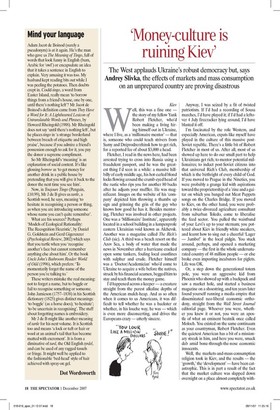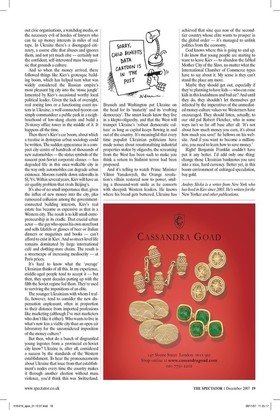'Money-culture is ruining Kiev'
The West applauds Ukraine's robust democracy but, says Andrey Slivka, the effects of markets and mass consumption on an unprepared country are proving disastrous Kiev Well, this was a fine one — the story of my fellow Yank Robert Fletcher, who'd been making a living hiring himself out in Ukraine, where I live, as a 'millionaire mentor' — that is, someone who could teach strivers from Sumy and Dniprodzerzhinsk how to get rich, for a reported fee of about $3,000 a head.
Fletcher, I read in the news here, had been arrested trying to cross into Russia using a fraudulent passport, and he was the greatest thing I'd seen in a while: a massive hillbilly of early middle age, his hot-curled blond locks flowing around the crumb-eyed head of the rustic who rips you for another 80 bucks after he adjusts your muffler. He was magnificent. Images on the website of his 'company' depicted him throwing a thumbs up sign and grinning the grin of the guy who knows how good he has it. Besides mentoring, Fletcher was involved in other projects. One was a 'Millionaire' Institute', apparently located in a school building in a lumpenprole eastern Ukrainian void known as Alchevsk. Another was a magazine called The Rich's Club (sic). A third was a beach resort on the Azov Sea, a body of water that made the news in November after a hurricane cracked open some tankers, fouling local coastlines with sulphur and crude. Fletcher himself was a 'Doctor/Academician' who'd come to Ukraine to acquire a wife before the natives, struck by his financial acumen, begged him to stay and teach them the money game.
I'd happened across a keeper — a creature straight from the purest alkaline depths of the American mulch-heap. And as so often when it comes to us Americans, it was difficult to tell whether he was a huckster or whether, in his louche way, he was — which is even more disconcerting, and drives the Europeans crazy — utterly sincere.
Anyway, I was seized by a fit of twisted patriotism. If I'd had a recording of Sousa marches, I'd have played it; if I'd had a leftover 4 July firecracker lying around, I'd have blasted it off.
I'm fascinated by the role Western, and especially American, expats like myself have played in the culture of this massive postSoviet republic. There's a little bit of Robert Fletcher in most of us. After all, most of us showed up here to do our small part to help Ukrainians get rich; to mentor potential millionaires; to induct post-Soviet citizens into that universal Rich's Club, membership of which is the birthright of every child of God. If you moved to Prague in the Nineties, you were probably a grunge kid with aspirations toward the proprietorship of a 'zine and a guitar on which you banged out Meat Puppets songs on the Charles Bridge. If you moved to Kiev, on the other hand, you were probably a twice-divorced agriculture consultant from suburban Toledo, come to liberalise the feed sector. You pulled the waistband of your Levi's up to your sternum; you pottered about Kiev in friendly white sneakers, and learnt how to sing out a cheerful 'Lager — Jumbo!' in the local pidgin You stuck around, perhaps, and opened a marketing company — the first in the whole undersaturated country of 48 million people — or else broke even importing incubators for piglets. Life was OK Or, a step down the generational totem pole, you were an aggressive kid from Phoenix who showed up with a backpack and saw a market hole, and started a business magazine on a shoestring, and ten years later found yourself running a media empire that disseminated neo-liberal economic orthodoxy, straight from the Wall Street Journal editorial page. Whoever you were, whether you knew it or not, you were an apostle of what an eminent beatnik once called Moloch. You existed on the same continuum as your countryman, Robert Fletcher. Even the quietest American has a bit of a missionary streak in him, and here you were, smack dab amid bone-through-the-nose economic innocents.
Well, the markets-and-mass-consumption religion took in Kiev, and the results — the 'growth,' the 'development' — have been catastrophic. This is in part a result of the fact that the market culture was slapped down overnight on a place almost completely without civic organisations, a watchdog media, or the necessary evil of hordes of lawyers who can tie up money interests in miles of red tape. In Ukraine there's a disengaged citizenry, a coarse elite that abuses and ignores them, and not yet much else — certainly not the confident, self-interested mass bourgeoisie that grounds a culture.
And so when the money arrived, there followed things like Kiev's grotesque building boom, which has helped turn what was widely considered the Russian empire's most pleasant big city into the 'stone jungle' lamented by Kiev's occasional worthy local political leader. Given the lack of oversight, real zoning laws or a functioning court system in Ukraine, a well-connected tycoon can simply commandeer a public park in a neighbourhood of low-slung charm and build a 26-storey office tower in the middle of it. It happens all the time.
Then there's Kiev's car boom, about which a treatise in dystopian urban sociology could be written. The sudden appearance in a compact city centre of hundreds of thousands of new automobiles — the status symbols of the nascent post-Soviet corporate classes — has degraded life in this once-walkable city in the way only automobiles can degrade urban existence. Morons rumble down sidewalks in SUVs. Within several years, Kiev will have an air-quality problem that rivals Beijing's.
It's also of no small importance that, given the influx of new money into the city, plus rumoured collusion among the governmentconnected building interests, Kiev's real estate has become as expensive as that in a Western city. The result is to kill small entrepreneurship in its cradle. That crucial urban actor — the guy who opens his own storefront and sells falafels or glasses of beer or Italian dinners or magazines and books — can't afford to exist in Kiev. And so street-level life remains dominated by large international café and clothing-store chains. The result is a streetscape of increasing mediocrity — at Paris prices.
It's hard to know what the 'average' Ukrainian thinks of all this. In my experience, middle-aged people tend to accept it — but then, they spent decades putting up with the filth the Soviet regime fed them. They're used to surviving the impositions of an elite.
The younger Ukrainians with whom I traffic, however, tend to consider the new dispensation unpleasant, often in proportion to their distance from imported professions like marketing (although I've met marketers who don't like it either). Who wants to live in what's now less a viable city than an open-air laboratory for the unconsidered imposition of the money culture?
But then, what do a bunch of disgruntled young ingrates from a provincial ex-Soviet city know? Ukraine is, after all, considered a success by the standards of the Western establishment. To hear the pronouncements about Ukraine that issue from that establishment's nodes every time the country makes it through another election without mass violence, you'd think this was Switzerland.
Brussels and Washington pat Ukraine on the head for its 'maturity' and its 'evolving democracy'. The smart locals know they live in a klepto-oligarchy, and that the West will trumpet Ukraine's 'robust democratic culture' as long as capital keeps flowing in and out of the country. It's meaningful that every time populist Ukrainian politicians have made noises about renationalising industrial properties stolen by oligarchs, the screaming from the West has been such to make you think a return to Stalinist terror had been proposed.
And it's telling to watch Prime Minister Viktor Yanukovych, the Orange revolution's villain restored now to power, smil ing a thousand-watt smile as he consorts with sheepish Western leaders. He knows where his bread gets buttered. Ukraine has achieved that sine qua non of the secondtier country whose elite wants to prosper in the global order — it's managed to unlink politics from the economy.
God knows where this is going to end up. I do know that young people are starting to want to leave Kiev — to abandon the fabled Mother City of the Slays, no matter what the International Chamber of Commerce types have to say about it. My sense is they can't stand the place any more.
Maybe they should get out, especially if they're planning to have kids —who can raise kids in this loutishness and bad air? And until they do, they shouldn't let themselves get infected by the imperatives of the unmediated money-culture values we Westerners have encouraged. They should listen, actually, to our old pal Robert Fletcher, who in some ways isn't so far off base after all. 'It's not about how much money you earn, it's about how much you save!' he bellows on his website. 'And if you want to become a millionaire, you need to learn how to save money.'
Right! Benjamin Franklin couldn't have put it any better. I'd add only one thing: change those Ukrainian banknotes you save into a nice, hard currency. Better yet, in this boom environment of unhinged speculation, buy gold.
Andrey Slivka is a writer from New York who has lived in Kiev since 2003. He's written for the New Yorker and other publications.






































































 Previous page
Previous page